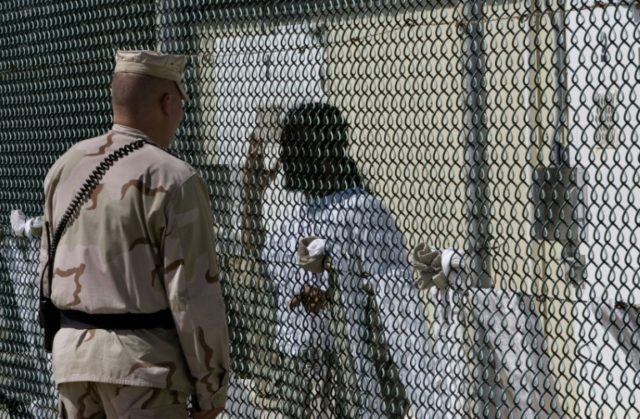Trump administration officials and European diplomats told NBC News on Thursday that hundreds of captured Islamic State (ISIS) fighters may be sent to Iraq for incarceration, with a few of the highest-value prisoners detained in the American facility at Guantanamo Bay, Cuba.
The NBC News report mentions two detainees who could be headed for Guantanamo, two of the four British-speaking ISIS jihadis known as “The Beatles.” (One of the other Beatles is dead, while the fourth is currently incarcerated in Turkey). The rest would be sent to Iraqi prisons with the United States retaining the right to prosecute them.
NBC noted that Democrats would prefer putting the ISIS fighters on trial in U.S. criminal courts:
Sen. Jeanne Shaheen, D-N.H., worries that sending the militants to Guantanamo would potentially turn them into martyrs. She has called on the Trump administration to prosecute those suspected of killing Americans in federal civilian courts to ensure they face justice.
A spokesperson for Sen. Shaheen said she has advocated for the ISIS killers of journalist James Foley “to be tried in federal courts in accordance with the wishes of the Foley family.”
Republican Sen. Lindsey Graham, a member of the Judiciary Committee, wants to see the two “Beatles” sent to Guantanamo as a temporary move before a possible trial in a civilian court in the U.S., a series of moves that would be prohibited under existing law.
Former Obama administration official Daniel Fried said putting any of the ISIS prisoners in Guantanamo Bay would be “the stupidest thing I’ve ever heard of,” because “once we do that, we own the problem and we have no solution, and then you can never let them go because of all the legislative restrictions.”
The fate of roughly 600 captive ISIS fighters remains uncertain because they were captured by the Syrian Democratic Forces (SDF), the U.S.-backed, Kurdish-led militia organization that controls a sizable amount of territory in northern Syria. The SDF opposes the regime of Syrian dictator Bashar Assad, although there are signs their relationship with Assad is thawing as the Syrian civil war winds down.
The SDF certainly has not warmed to Assad enough to hand hundreds of Islamic State prisoners over the Syrian government. Many of them are foreigners to boot, adding an international legal dimension to their cases—including the stubborn refusal of many countries to take ISIS prisoners back.
In fact, no country was willing to take Islamic State prisoners from the SDF at first. The Trump administration was eventually able to convince Macedonia and Lebanon to take a handful, while Tunisia and Kazakhstan are mulling over the possibility. Tunisia has demanded payment for taking Tunisian ISIS prisoners into custody. The reason two of “the Beatles” might be headed for Guantanamo is that Britain rescinded their citizenship and refuses to take custody of them.
“The prisoners pose a dilemma that has no easy solution and that is growing urgent,” the New York Times warned in July. “Their home countries have been reluctant to take back the men. Their governments are leery that battle-hardened members of the Islamic State, also known as ISIS, might radicalize domestic prisoners. Some countries face legal hurdles to prosecuting militants if they take custody of them from a nonstate militia, as opposed to extraditing them from another government.”
Democrats who advocate putting ISIS fighters through the U.S. legal system have yet to explain why Americans should not be worried about Islamic State jihadis radicalizing the prison population, the way every other nation evidently is.
The SDF lacks the resources to hold the prisoners indefinitely. Many of them have wives and children, and some of the children are old enough to be potential security threats. Even transfer to Iraqi prisons could be a stopgap measure at best, as the Iraqis are not eager to take them and will only prosecute militants captured on Iraqi soil. Human-rights groups complain that Iraq has a track record of abusing and executing prisoners.
The SDF has only been willing to prosecute ISIS fighters from Syria, not foreign recruits, and it doesn’t enjoy the status of a sovereign government, so it would be politically and legally difficult for it to put foreigners in front of terrorism tribunals. Jailbreaks from the improvised detention facilities are a constant concern, as is the possibility the SDF will lose control of its jails when Syrian or Turkish forces seize its territory.
“I’m worried about the larger situation. It’s not really as sustainable as I thought it was. The detainees are going to be out on the street—or dead,” Sen. Lindsey Graham (R-SC) said after visiting an SDF prison in July.
The disposition of captured ISIS fighters is a seemingly insoluble crisis that everyone should have seen coming, since it has long been known the Islamic State aggressively recruited from countries around the world. And yet, every option is constantly rejected by someone: the Europeans won’t take them, human-rights groups fear what the Iraqis and Syrians would do to them, the Kurds can’t hold them, other jihadi groups want to recruit them, and mass executions are out of the question.

COMMENTS
Please let us know if you're having issues with commenting.